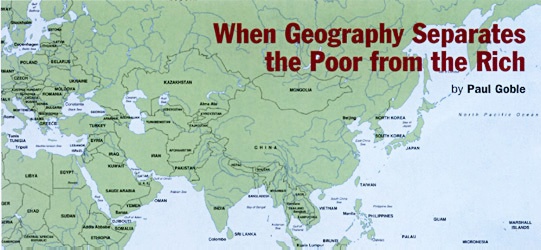|
Summer 1998 (6.2)  Reprinted with permission
from Radio Free Europe / Radio Liberty, broadcast on April 27,
1998. In papers presented last week to the World Bank's annual conference in Washington on developmental economics, Jeffrey Sachs and John Luke Gallup showed that two factors-access to a seaport and a temperate climate that holds down diseases-explained some 50 percent of the gap in incomes between rich and poor nations. These findings have important consequences for the ways in which scholars analyze the course of economic development around the world, for the policies governments pursue to improve the economic situations in their countries, and for the kind of tensions that are likely to emerge between central governments and their hinterlands depending on the location of the latter. First, and perhaps most dramatically, these findings are likely to have a significant impact on some widespread conceptions about the relative role of culture and location in determining economic outcomes. Over the past century, economists have routinely pointed to differences in natural resources and climate as major factors in explaining differences in wealth. But in the last decade, culturalist explanations have made a comeback, and these have often led some analysts and international bankers to decide that some cultures are fated to succeed while others are fated to fail. The Sachs-Gallup analysis challenges this set of assumptions in a double way. On the one hand, it adds access to ports as a geographic factor with economic explanations. They explicitly note that as shipping costs continue to fall, economic integration and specialization is far more likely to take place among countries that can trade via sea or major river systems. And on the other, it represents a direct attack on the idea that culture by itself explains economic growth. To the extent that Sachs and Gallup are correct-and the evidence they provide is impressive-that conclusion suggests that institutions, international and domestic, trying to promote growth should focus more on guaranteeing transportation routes and engineering cultural change. Second, these findings provide some important guidance to national governments on what they should try to do to promote economic growth relative to other countries-and equally important on what won't work and on what they can't do. The Sachs-Gallup papers suggest that governments interested in promoting economic growth should seek to maximize their access to ports or at a minimum to rationalize their transportation systems in ways that will link them to ports and thus allow their economies to specialize. As international trade has become more important and as the costs of transportation by sea have continued to fall relative to other means, countries that are able to take advantage of these twin imperatives can specialize and thus grow richer. Building ports, improving transportation networks to gain access to ports, and building cooperative relationships with neighboring countries if one's own lacks ports thus become among the most important tasks of governments and business communities in any of these states. Not only does that suggest that governments should shift some energy and resources away from programs designed to produce the kinds of cultural change that some have thought essential to growth, but it also suggests that many countries suffering from low growth and poverty are not to blame because they cannot change the fundamental reality explaining both-their geographic location. That finding, in turn, suggests that both they and outside observers should be less dogmatic in asserting that some countries can't change unless they transform their cultures. And third, the findings presented at the World Bank last week have profound consequences for relationships within countries, not only between the capital and the periphery but also between port cities and hinterlands. The Sachs-Gallup analysis suggests that governments will be confronted by the task of managing a new set of center-periphery tensions arising from the impact of transportation costs on the ability to specialize. High land transp-ortation costs are likely to leave the hinterlands of many states less specialized than port cities will be. Such differences in turn will have an impact on the incomes and wealth of these two sets of regions. And those variations are likely to power demands for governmental intervention to reallocate wealth or, in extreme cases, for new forms of autonomy or even secession. The ways in which these factors
will affect individual countries and, indeed, the world, will
vary depending on what individuals and governments make of them.
But something that may seem to many to be a rather abstruse analysis,
is likely to have very concrete consequences for everyone involved.
|
